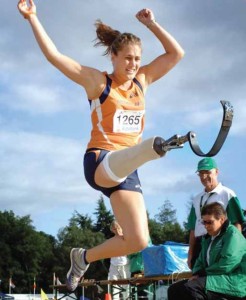
I came across the term “differently-abled” a few years ago, and thought it was just an eye-roll-inducing invention by the hyper politically correct. In the past year, however, I have come to see it in a positive, even necessary light.
Most people in this country have heard of the ongoing debate about the appropriateness of cochlear implants in people who are deaf. Some say, for people born deaf, that to give that person an implant would be to “force” them to be someone other than the person they were born to be. Others say, as they do with artificial limbs, that the enhancement returns the receiver to their “natural” state (“as God intended,” some clarify).
Although I personally do not like the idea of encouraging a deaf child to grow up in an isolated community of deaf people without getting a taste of the “outside” world, there is something to be said for existing among those who respect and understand you. We all do it—people like to be comfortable, and they should not be shamed for it when the world is as cold as it is a lot of the time. However, whether the deaf person accepts the cochlear implant or the war vet accepts a prosthetic limb, the question remains—are they disabled?
I have a friend who broke his back in a four-wheeler accident in middle school and is now on the U.S. Paralympic Ski Team—and dominating. He also works as a radio DJ, professional motivational speaker, and retail salesman with me. He gets around using forearm crutches, and until recently, I thought of him as disabled.
Then another friend, unknown to the previous one, who has a sister with Down syndrome, said to me, “When your friend got in his accident, he was disabled—but is he still disabled?” I hadn’t thought of it that way before.
Rosemarie Garland Thomsen wrote a book called Extraordinary Bodies, in which she claims that “the cripple before the stairs, the blind person before the typewriter . . . are all proof that the . . . practices of material, daily life enforce the cultural standard of a universal subject with a narrow range of corporeal variation.”
This is a tough sentence, but it strikes at the heart of the issue of “disability.” Is a person disabled because they are incapable of functioning as the majority of society does on a daily basis, or because the current conditions of everyday life do not account for their adaptive way of performing actions required in everyday life?
For example, I have another friend, who has been confined to a wheelchair since long before we met, who asked me about getting a job at the store where I used to work. If he could stand, he might be four-and-half-feet tall. I encouraged him to fill out an application, but in my head I was thinking, “Really? How do you think you could work here? You can’t reach the desks! You can’t stock most of the goods we have in the store, because they’re too big or too high on the shelf!”
This sounds like an issue of practicality, but isn’t it possible that the real problem lies in the fact that the set-up of the store is not “handicap-accessible?”
If people feel guilty about not hiring people for their disabilities on the basis of practicality, maybe our notion of what is practical needs to change.
Someone will say, “It’s expensive to install mechanisms which allow for a handicap-accessible store,” or “he’s only one person; it’s not worth it.” But that person believes that it would be worth it. That person has dreams.
Maybe you also have dreams. Maybe this is old news to you, and you have been searching for people to agree with you, to make this kind of equality possible. Perhaps it starts by changing our vocabulary—get rid of “disabled,” and start using “diff-abled” to describe those who have mastered their disability, who have learned to live life fully with a differently-functioning body. It sounds silly, at first, like trying to say “disabled” with a lisp. So what? It starts a conversation. Maybe eventually it will sound “normal.”